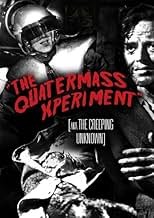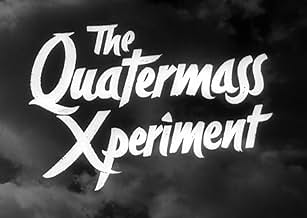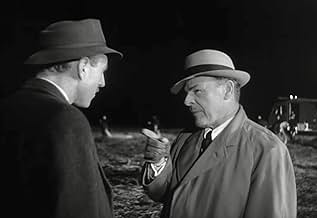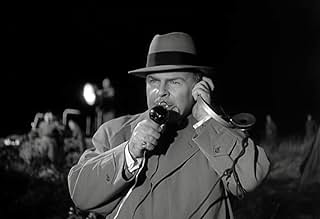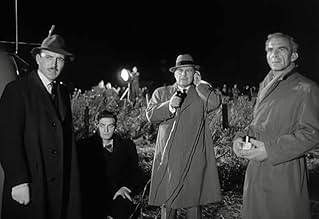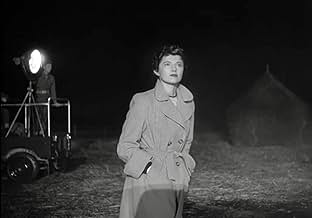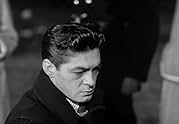IMDb रेटिंग
6.6/10
8 हज़ार
आपकी रेटिंग
अपनी भाषा में प्लॉट जोड़ेंProfessor Bernard Quatermass' manned rocket ship returns to Earth, but two of the astronauts are missing and the survivor seems ill and unable to communicate.Professor Bernard Quatermass' manned rocket ship returns to Earth, but two of the astronauts are missing and the survivor seems ill and unable to communicate.Professor Bernard Quatermass' manned rocket ship returns to Earth, but two of the astronauts are missing and the survivor seems ill and unable to communicate.
- निर्देशक
- लेखक
- स्टार
Jane Aird
- Mrs. Lomax
- (बिना क्रेडिट के)
Margaret Anderson
- Maggie
- (बिना क्रेडिट के)
Jane Asher
- Little Girl
- (बिना क्रेडिट के)
Harry Brunning
- Night Porter
- (बिना क्रेडिट के)
Ken Buckle
- Police Driver
- (बिना क्रेडिट के)
Eric Corrie
- Maggie's Boyfriend
- (बिना क्रेडिट के)
Edward Dane
- Station Policeman
- (बिना क्रेडिट के)
Gron Davies
- Charles Green
- (बिना क्रेडिट के)
फ़ीचर्ड समीक्षाएं
Horror/science fiction films have rarely been singled out for the quality of the acting in them. Over the decades, a couple of "monsters" have been tapped for praise: Fredric March won an Oscar for his turn at Jekyll and Hyde, & Jeff Goldblum was rightly seen as an example of "inspired casting" in David Cronenberg's remake of _The Fly_.
But I think Richard Wordsworth has them both beat.
I enjoy _The Creeping Unknown_ overall, but it is Wordsworth's performance as Victor Caroon that lifts it into the stratosphere for me. I mean, sheesh, _look_ at him! This is an incredibly painful and, yes, passionate portrait of a man whose _body_ is being taken over and is changing into something else, even as he fights to retain possession of it. What might such a battle _feel_ like? Wordsworth lets you know, and in doing so anchors an almost cliché science-fiction "what if ...?" in raw human nerve endings. Watch him battle the frightening desires that overcome him; watch him try to stay ... human. He's first class, and why his career never really took off ...
I am probably all alone on a windswept plain in this, but I think Wordsworth's acting here is as frenzied and solid as that of Klaus Kinski in any of the great movies he did with Werner Herzog. So shoot me! :)
But I think Richard Wordsworth has them both beat.
I enjoy _The Creeping Unknown_ overall, but it is Wordsworth's performance as Victor Caroon that lifts it into the stratosphere for me. I mean, sheesh, _look_ at him! This is an incredibly painful and, yes, passionate portrait of a man whose _body_ is being taken over and is changing into something else, even as he fights to retain possession of it. What might such a battle _feel_ like? Wordsworth lets you know, and in doing so anchors an almost cliché science-fiction "what if ...?" in raw human nerve endings. Watch him battle the frightening desires that overcome him; watch him try to stay ... human. He's first class, and why his career never really took off ...
I am probably all alone on a windswept plain in this, but I think Wordsworth's acting here is as frenzied and solid as that of Klaus Kinski in any of the great movies he did with Werner Herzog. So shoot me! :)
A British spaceship returns to Earth but instead of celebrating this first space shot, there is a lot of confusion, as two of the three crew members are missing. Additionally, the one who DID return just doesn't look or act right and he's kept under supervision and monitored as his body seems to be undergoing some sort of metamorphosis.
This isn't exactly your standard 1950s sci-fi/monster film, as the story itself is more tightly written and seems more credible than the typical "bug-eyed monster" film. Instead of the over the top acting and silly special effects, this is a more cerebral style film and the "monster" doesn't even make an appearance until near the very end. Instead, the story slowly unfolds and at the same time, simple makeup does the trick--no ping pong ball eyes, giant killer lobsters or any of the sort of tripe seen in the sillier examples of the genre. About the only negative was the whole subplot of the wife trying to kidnap her husband away from the hospital--this didn't make a lot of sense. Still, overall it's a dandy sci-fi film and worth a look.
This isn't exactly your standard 1950s sci-fi/monster film, as the story itself is more tightly written and seems more credible than the typical "bug-eyed monster" film. Instead of the over the top acting and silly special effects, this is a more cerebral style film and the "monster" doesn't even make an appearance until near the very end. Instead, the story slowly unfolds and at the same time, simple makeup does the trick--no ping pong ball eyes, giant killer lobsters or any of the sort of tripe seen in the sillier examples of the genre. About the only negative was the whole subplot of the wife trying to kidnap her husband away from the hospital--this didn't make a lot of sense. Still, overall it's a dandy sci-fi film and worth a look.
Before a little British company called Hammer became famous for Dracula and Frankenstein, there were the adventures of Professor Bernard Quatermass. Based on the live BBC serial from 1953, The Quatermass Xperiment put Hammer on the film world map. How that happened it obvious from this tense, realistic, and gritty science fiction classic.
The film is immensely helped by an excellent cast. Brian Donlevy's Quatermass is the archetype science fiction film scientist: a scientist obsessed with their quest for science before turning having to deal with the consequences of that quest. Donlevy plays Quatermass to perfection as a scientist who is both horrified and fascinated by the events he has set in motion. It's a strong performance filled with realism. fascination and horror. The cast also includes terrific performances from Jack Warner as Scotland Yard's Inspector Lomax, Margia Dean who takes the potentially clichéd Judith Carroon and puts flesh and blood on the character, and David King-Wood as Quatermass's fellow scientist Doctor Briscoe. The best performance of the film may well be from the character who never speaks: Richard Wordsworth as Victor Carroon. Wordsworth perfectly plays both the horror of the lone surviving astronaut and also sympathy as the worst off victim of the Quatermass experiment. This is especially true in a scene where Caroon finds himself at a dock where a little girl approaches him with her doll. It reminds one of the scene from the Universal Frankensein where the seemingly innocent takes on a darker meaning. Overall, the film has a terrific cast of actors bringing it to life.
At a time when science fiction films were defined by the clichéd and outrageous monster and alien invasion films, this film (and its TV counterpart) went in the exact opposite direction. Director Val Guest choose to do the film not in the style of the time but in a near documentary style. That's why the film work's fifty years later: it seems real in that it is a product of its time are place. If Britian had started the space race in the mid-1950's, one feels this is how it would have been.
The film is also helped by two very strong elements: the black and white cinematography and the music score. Doing the film in black and white adds atmosphere to a film that is part alien invasion and part manhunt. It helps especially in the film's fiery finale. The music score by James Bernard is terrific in adding to the atmosphere of the film and it never intrudes, but just helps to bring one a little bit closer to the edge of one's seat. The film wouldn't be the same without either one of these two elements.
Yet as much as I would like to call this film perfect, it isn't. There is one thing that the film hits and misses on: special effects. The downside of the film being so much a product of its time is that when the special effects are looked back at from a distance, they look primitive. That's not to say that the special effects are bad. The prosthetics work in particular looks good even by today's standards as far as I'm concerned. The finale of the film is the most obvious spot where the special effects are a bit of a let down by modern standards. Then again, it is hard to compare special effects from one era to another so this is an issue for the viewer to decide on.
While the special effects may hamper the film for some, one must admit that The Quatermass Xperiment is a classic of the genre. From the terrific performance (espeically of Donlevy and Wordsworth), to the realistic style and tone, to the excellent cinematography, to the dark score by Jame Bernard, The Quatermass Xperiment is a tour de force for the more intelligent and less action based science fiction films. If you can put aside the mid-1950's special effects, you're going to find a tense, realistic, and gritty science fiction classic.
The film is immensely helped by an excellent cast. Brian Donlevy's Quatermass is the archetype science fiction film scientist: a scientist obsessed with their quest for science before turning having to deal with the consequences of that quest. Donlevy plays Quatermass to perfection as a scientist who is both horrified and fascinated by the events he has set in motion. It's a strong performance filled with realism. fascination and horror. The cast also includes terrific performances from Jack Warner as Scotland Yard's Inspector Lomax, Margia Dean who takes the potentially clichéd Judith Carroon and puts flesh and blood on the character, and David King-Wood as Quatermass's fellow scientist Doctor Briscoe. The best performance of the film may well be from the character who never speaks: Richard Wordsworth as Victor Carroon. Wordsworth perfectly plays both the horror of the lone surviving astronaut and also sympathy as the worst off victim of the Quatermass experiment. This is especially true in a scene where Caroon finds himself at a dock where a little girl approaches him with her doll. It reminds one of the scene from the Universal Frankensein where the seemingly innocent takes on a darker meaning. Overall, the film has a terrific cast of actors bringing it to life.
At a time when science fiction films were defined by the clichéd and outrageous monster and alien invasion films, this film (and its TV counterpart) went in the exact opposite direction. Director Val Guest choose to do the film not in the style of the time but in a near documentary style. That's why the film work's fifty years later: it seems real in that it is a product of its time are place. If Britian had started the space race in the mid-1950's, one feels this is how it would have been.
The film is also helped by two very strong elements: the black and white cinematography and the music score. Doing the film in black and white adds atmosphere to a film that is part alien invasion and part manhunt. It helps especially in the film's fiery finale. The music score by James Bernard is terrific in adding to the atmosphere of the film and it never intrudes, but just helps to bring one a little bit closer to the edge of one's seat. The film wouldn't be the same without either one of these two elements.
Yet as much as I would like to call this film perfect, it isn't. There is one thing that the film hits and misses on: special effects. The downside of the film being so much a product of its time is that when the special effects are looked back at from a distance, they look primitive. That's not to say that the special effects are bad. The prosthetics work in particular looks good even by today's standards as far as I'm concerned. The finale of the film is the most obvious spot where the special effects are a bit of a let down by modern standards. Then again, it is hard to compare special effects from one era to another so this is an issue for the viewer to decide on.
While the special effects may hamper the film for some, one must admit that The Quatermass Xperiment is a classic of the genre. From the terrific performance (espeically of Donlevy and Wordsworth), to the realistic style and tone, to the excellent cinematography, to the dark score by Jame Bernard, The Quatermass Xperiment is a tour de force for the more intelligent and less action based science fiction films. If you can put aside the mid-1950's special effects, you're going to find a tense, realistic, and gritty science fiction classic.
The Quatermass series both inspired and paved the way for many sci-fi greats that would follow it, from shows such as 'Doctor Who' to 'Alien'. Indeed both of these examples successfully blended horror with sci-fi just as Quatermass did right in its very first outing - 'The Quatermass Experiment'. The horror element no doubt also inspired Hammer Films to do this remake only two years after the original series, and they do it well.
Pre-dating Gagarin's successful trip into space, the story involves the first successfully-manned rocket returning from its maiden voyage. The program is headed by professor Bernard Quatermass of the British Rocket Group - a man extremely determined to push the frontiers of science - even if it means sacrificing lives. There's more than a touch of Jules Verne's science-is-the-beginning-and-the-ending about this man. Unfortunately, upon the rocket's return, where there were once three men there is now but one. To top it off, he doesn't seem to be feeling especially well - and it isn't travel sickness.
In 'Xperiment', Quatermass is portrayed by American Brian Donlevy, no doubt to broaden the film's potential market. Donlevy gives his version absolute conviction - this is a man who will not be stopped by any setbacks, convinced as he is that humans must become an interplanetary species. We really need people like him today. Other well-known actors of the day round out the strong cast, but I'd also like to give special mention to Richard Wordsworth, as the troubled sole-surviving astronaut Victor Caroon. Wordsworth could convey so much with just his face that he has presence without uttering a word.
The film also capitalises on the way space - particularly then, is a great unknown, where anything nice or nasty could happen simply by being there. As a result of the rocket's return, something wicked this way does come, and Hammer show their great skill not only in realising it effectively, but in creating wonderfully suspenseful moods in between. Doubtless the monochrome provides many more helpful dark shadows in this endeavour, but the production values really are more than good enough to convince even today.
So with a fascinating story by creator Nigel Kneale, well-chosen actors, and an excellent big-screen realisation, 'The Quatermass Xperiment' still shows why it pioneered what was to come. But more than that, it's still excellent in its own right.
Pre-dating Gagarin's successful trip into space, the story involves the first successfully-manned rocket returning from its maiden voyage. The program is headed by professor Bernard Quatermass of the British Rocket Group - a man extremely determined to push the frontiers of science - even if it means sacrificing lives. There's more than a touch of Jules Verne's science-is-the-beginning-and-the-ending about this man. Unfortunately, upon the rocket's return, where there were once three men there is now but one. To top it off, he doesn't seem to be feeling especially well - and it isn't travel sickness.
In 'Xperiment', Quatermass is portrayed by American Brian Donlevy, no doubt to broaden the film's potential market. Donlevy gives his version absolute conviction - this is a man who will not be stopped by any setbacks, convinced as he is that humans must become an interplanetary species. We really need people like him today. Other well-known actors of the day round out the strong cast, but I'd also like to give special mention to Richard Wordsworth, as the troubled sole-surviving astronaut Victor Caroon. Wordsworth could convey so much with just his face that he has presence without uttering a word.
The film also capitalises on the way space - particularly then, is a great unknown, where anything nice or nasty could happen simply by being there. As a result of the rocket's return, something wicked this way does come, and Hammer show their great skill not only in realising it effectively, but in creating wonderfully suspenseful moods in between. Doubtless the monochrome provides many more helpful dark shadows in this endeavour, but the production values really are more than good enough to convince even today.
So with a fascinating story by creator Nigel Kneale, well-chosen actors, and an excellent big-screen realisation, 'The Quatermass Xperiment' still shows why it pioneered what was to come. But more than that, it's still excellent in its own right.
Unfortunately Nigel Kneal had absolutely no input into the film version of THE QUATERMASS EXPERIMENT . Out goes the philosophy and long discussions of the human condition and in comes the more formuliac and streamlined plotting of a hostile alien endangering the human race , but to be fair to Richard Landau he also jettisoned many underdeveloped subplots from the serial ( When episode one of TQE was broadcast on television Kneale was still writing episode 5 so some subplots were abandoned by Kneale in order to meet the deadline ) and - unlike film viewers in 2002 - the oft used premise of an alien entity coming back to Earth from a spaceship would still be very new to cinema audiences in the mid 50s. I might even be right in saying this is the first time this idea had appeared in cinema .
Director Val Guest treats THE QUATERMASS EXPERIMENT as SF film noir and brings in a heavy dose of mood and atmosphere especially during the night time zoo sequence. Unlike QUATERMASS 2 there`s no feeling that the night scenes were achieved by sticking a dark filter over the camera . Guest is less successful with his cast . Donlevy is relatively good at playing double crossing mobsters in the likes of THE BIG COMBO but he`s utterly unconvincing as a rocket scientist and it doesn`t help that he keeps pronouncing his name as " Qittermiss ", Margia Dean is utterly appalling as Judith Carroon , but Richard Wordsworth is outstanding as Victor Carroon even if he doesn`t have a single line of dialogue.
The BBC serial of THE QUATERMASS EXPERIMENT shocked the viewers of Britain when it was broadcast and in its own way the film version is almost as groundbreaking , it was a big hit at the UK box office which led to Hammer Films to concentrate solely on horror films something they would excell at for the next 10-15 years .
Trivia point 1 - The montage scenes of soldiers searching for Carroon at night time are actually culled from another British SF flick - SEVEN DAYS TO NOON
Trivia point 2- The last four episodes of the BBC serial were shown live on television but because of an industrial dispute they weren`t - unlike the first two episodes - recorded onto film which means no one will ever see the complete BBC QUATERMASS EXPERIMENT
Director Val Guest treats THE QUATERMASS EXPERIMENT as SF film noir and brings in a heavy dose of mood and atmosphere especially during the night time zoo sequence. Unlike QUATERMASS 2 there`s no feeling that the night scenes were achieved by sticking a dark filter over the camera . Guest is less successful with his cast . Donlevy is relatively good at playing double crossing mobsters in the likes of THE BIG COMBO but he`s utterly unconvincing as a rocket scientist and it doesn`t help that he keeps pronouncing his name as " Qittermiss ", Margia Dean is utterly appalling as Judith Carroon , but Richard Wordsworth is outstanding as Victor Carroon even if he doesn`t have a single line of dialogue.
The BBC serial of THE QUATERMASS EXPERIMENT shocked the viewers of Britain when it was broadcast and in its own way the film version is almost as groundbreaking , it was a big hit at the UK box office which led to Hammer Films to concentrate solely on horror films something they would excell at for the next 10-15 years .
Trivia point 1 - The montage scenes of soldiers searching for Carroon at night time are actually culled from another British SF flick - SEVEN DAYS TO NOON
Trivia point 2- The last four episodes of the BBC serial were shown live on television but because of an industrial dispute they weren`t - unlike the first two episodes - recorded onto film which means no one will ever see the complete BBC QUATERMASS EXPERIMENT
क्या आपको पता है
- ट्रिवियाThe film achieved notoriety Stateside when in 1956 the parents of Stewart Cohen attempted to sue Chicago's Lake Theater and distributors United Artists for negligence after their nine-year-old son died of a ruptured artery at a double-bill of this and The Black Sleep (1956) on Sunday 28th October, during the opening sequence of the Hammer movie. Cohen entered the Guinness Book of Records as the only known case of someone literally dying of fright at a horror film (he had been unknowingly living with an undiagnosed heart condition): pathologist Dr Albert Baugher officially found that "The boy died of a heart collapse after extraordinary tension while watching a film."
- गूफ़Volkswagen Bus en route to the crash site is not the same Volkswagen Bus that arrives through the gate at the crash site. VW badge is larger, chrome trim is missing and license plate is different.
- भाव
Prof. Bernard Quatermass: There's no room for personal feelings in science, Judith!
- इसके अलावा अन्य वर्जनThe original 1955 "Quatermass Xperiment" print has the closing caption "The End"; the reissued version (with a still bearing the new title "The Quatermass Experiment" inserted into the opening credits) replaces this with "A Hammer Production Produced at Bray Studios".
- कनेक्शनFeatured in Frances Farmer Presents: The Creeping Unknown (1959)
टॉप पसंद
रेटिंग देने के लिए साइन-इन करें और वैयक्तिकृत सुझावों के लिए वॉचलिस्ट करें
- How long is The Quatermass Xperiment?Alexa द्वारा संचालित
विवरण
- रिलीज़ की तारीख़
- कंट्री ऑफ़ ओरिजिन
- भाषा
- इस रूप में भी जाना जाता है
- Pánico mortal
- फ़िल्माने की जगहें
- East India Docks, London, Greater London, इंग्लैंड, यूनाइटेड किंगडम(derelict boat scene with little girl)
- उत्पादन कंपनी
- IMDbPro पर और कंपनी क्रेडिट देखें
बॉक्स ऑफ़िस
- बजट
- £45,000(अनुमानित)
- चलने की अवधि
- 1 घं 22 मि(82 min)
- रंग
- ध्वनि मिश्रण
- पक्ष अनुपात
- 1.37 : 1(original/negative aspect ratio, alternative theatrical ratio)
इस पेज में योगदान दें
किसी बदलाव का सुझाव दें या अनुपलब्ध कॉन्टेंट जोड़ें


